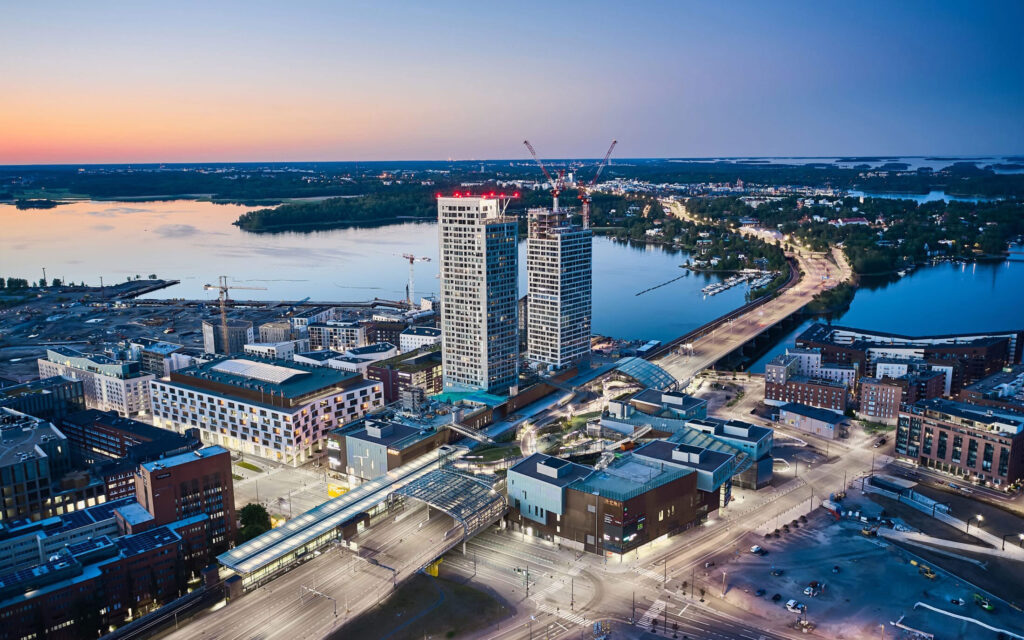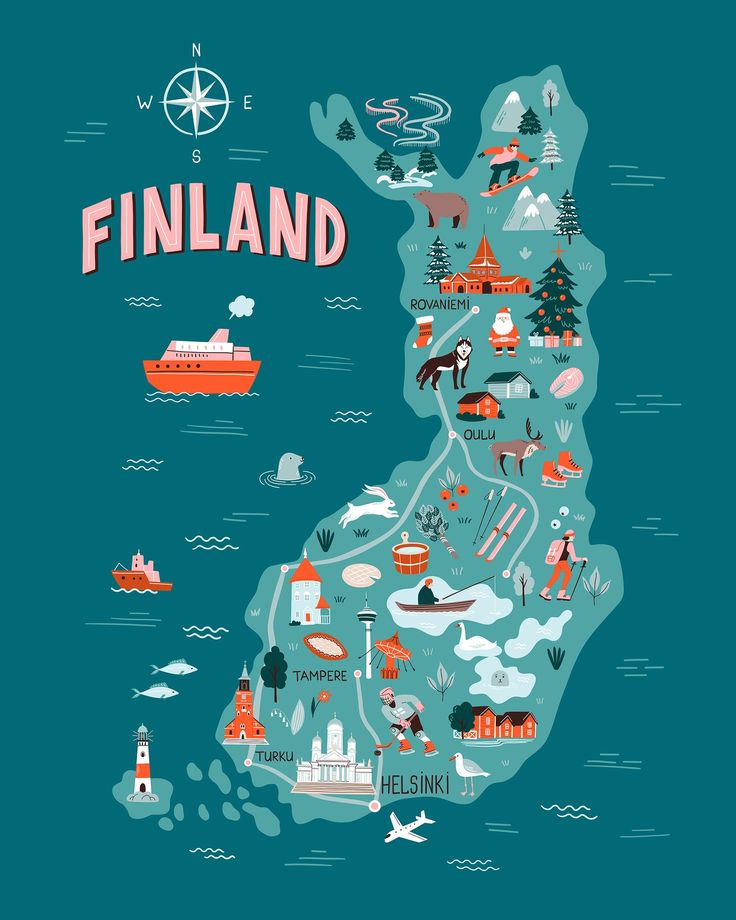
Why Finland is a Top Choice for International Students
Finland, in Northern Europe, is famous for its excellent education system, beautiful landscapes, and safe lifestyle. Cities like Helsinki and Tampere mix modern life with nature, offering lakes, forests, and clean air. Finland is also known for its innovative ideas, eco-friendly lifestyle, and political stability. With free healthcare and an active social scene, it’s a great place for students from around the world.
For Nepalese students, Finland provides affordable, high-quality education. Many universities offer English-taught programs in subjects like engineering, IT, and business. Students can apply for scholarships to help with tuition. Living costs are reasonable, with student discounts on housing and transportation. There are also part-time job opportunities to support students during their studies.

Table of Contents
Why Nepali Students Choose to Study in Finland
High-Quality Education
Finland is known for its great education system. Universities like the University of Helsinki and Aalto University are famous for their teaching and research. Many Nepali students want to benefit from this high standard of learning.
Affordable Tuition Fees
Tuition fees in Finland are generally lower than in many Western countries. This makes it easier for Nepali students to afford their studies. Many programs offer competitive prices, especially for students from EU nations.
Scholarship Opportunities
There are many scholarships available for international students in Finland. These can help reduce costs, making studying more affordable for Nepali students.
English-Taught Programs
Many Finnish universities offer a range of programs taught in English. This means Nepali students do not need to learn Finnish or Swedish to study here, making it easier for them to enroll.
Safe Environment
Finland is one of the safest countries in the world. The friendly and open culture makes it a welcoming place for international students, helping them feel comfortable.
Work Opportunities
While studying, students can work part-time. This helps cover living costs and gives Nepali students valuable work experience in an international setting.
Focus on Student Well-Being
Finnish universities focus on student well-being. They offer support services like counseling and academic help, ensuring students have the resources they need to succeed.
Cultural Experience
Studying in Finland allows Nepali students to experience a unique culture. Finland values sustainability and innovation, providing a rich environment for personal and academic growth.

10 Fascinating Facts About Finland for Future Students
High-Quality Education: Finland’s education system is renowned worldwide for its quality. It consistently ranks at the top in international assessments, focusing on student well-being and creativity rather than rote memorization. Source: World Economic Forum
Free Higher Education: For EU and EEA students, higher education in Finland is free. Even non-EU students can find relatively affordable tuition rates compared to other Western countries.
Breathtaking Nature: Finland is known for its stunning natural beauty, featuring over 188,000 lakes and about 180,000 islands. Outdoor activities like hiking, skiing, and swimming are popular among locals and students alike.
Sauna Culture: Saunas are an essential part of Finnish culture. There are approximately 2 million saunas in Finland, meaning there’s roughly one sauna for every 2.5 people! Visiting a sauna is a common social activity.
Innovative Technology: Finland is known as a hub for technology and innovation. Companies like Nokia and startups in the tech industry have significantly contributed to its economy. The country invests heavily in research and development. Source: Finnish Innovation Agency
Safety and Security: Finland is consistently ranked as one of the safest countries in the world. The crime rate is low, and the country has a stable political environment, making it an ideal place for international students. Source: Global Peace Index
Multilingual Environment: While Finnish and Swedish are the official languages, many Finns speak English fluently. This makes it easier for international students to communicate and settle in.
Rich Cultural Heritage: Finland has a vibrant cultural scene, with numerous festivals, museums, and art galleries. Events like the Helsinki Festival and the Night of the Arts showcase the country’s artistic talents.
Unique Climate: Finland experiences four distinct seasons, with long winters and short summers. Students can enjoy activities like skiing in winter and exploring the midnight sun in summer. Source: Finnish Meteorological Institute
Sustainability Leader: Finland is committed to sustainability and environmental conservation. The country is known for its clean air, renewable energy initiatives, and a strong focus on sustainable living. Source: Ministry of the Environment, Finland
Academic Qualifications for Studying in Finland
If you are a Nepali student interested in studying in Finland, understanding the academic qualifications is essential. Here’s a breakdown of the requirements that will help you navigate your educational journey.
1. Rolling or Direct Admissions
- Year 12: A minimum GPA of 2.8 or a CTEVT Diploma with 70% is required. Some universities may also require SAT scores.
2. Joint Application
- Year 12: A minimum GPA of 2.20 or a CTEVT Diploma with 60% is necessary for joint applications.
3. Separate Application
- Most universities have similar requirements as those for rolling or direct admissions, ensuring consistency across institutions.
4. SAT Score
- A score of 1450 or higher on the SAT can qualify you for a 50% scholarship, which significantly reduces tuition costs.
5. Early Bird Scholarship
- Students who accept and pay their first-year tuition fee within 7 to 20 days of receiving the offer can receive a discount of 10% to 20%.
6. Change of Faculty
- Students may change their faculty under certain conditions, subject to university policies.
7. Interviews
- Rolling or Direct Applicants: These students will be scheduled for an online interview.
- Joint Applicants: Must pass the International UAS Exam Online and may also be required to attend an online interview.
8. Student Residence Permit Types
- Type A: For Bachelor’s programs, where the study duration counts towards permanent residency.
- Type B: A temporary student permit, often for diplomas in Hospitality Management and Business. It’s not recommended unless combined with a Bachelor’s degree since it does not contribute to permanent residency status.
English Language Proficiency Requirements
To study in Finland, you must demonstrate proficiency in English through the following minimum scores:
- IELTS: An overall score of 6.0.
- PTE: An overall score of 55.
- TOEFL: A minimum overall score of 80.

Essential Documents for Your Study Application in Finland
If you are a Nepali student planning to apply for higher education in Finland, here’s a comprehensive list of essential documents you will need:
SLC Documents:
- Transcript, Character Certificate, and Award Certificate, all attested by the Secondary Education Examination (SEE) at Sano Thimi, Bhaktapur.
Year 11 & 12 Documents:
- Transcript, Character Certificate, and Provisional Certificate, attested by the National Examination Board (NEB) at Sano Thimi, Bhaktapur.
Bachelor’s Degree Documents:
- Transcript, Provisional Certificate, and Character Certificate, attested by your respective university.
Passport Documents:
- Front cover and biodata page of your E-Passport, both attested by the Ministry of Foreign Affairs (MoFA) in Tripureshwor.
Employment Verification:
- If applicable, provide an employment letter that details your job duties and responsibilities for any verifiable gap.
Marriage Documents (if applicable):
- Spouse’s Passport and Marriage Certificate (more than 12 months old), both attested by MoFA.
Curriculum Vitae:
- A detailed CV for both you and your spouse in soft copy.
English Proficiency Proof:
- Include your IELTS TRF or PTE login details.
Letters of Recommendation:
- Two letters of recommendation from credible sources who can vouch for your academic or professional skills.
Sponsor Documents Required for Studying in Finland
Sponsor Income Details:
- Identify your sponsors, which can include parents, in-laws, uncles, and aunts.
Annual Income Requirements:
- For a single applicant: 18 to 20 Lakhs.
- For applicants with an accompanying spouse: 22 to 25 Lakhs.
Bank Statement:
- Provide a recent bank statement covering the last 6 months.
Income Source Verification:
- Obtain verification from your local Ward or Municipality.
Tax Clearance Certificate:
- Acquire a tax clearance certificate from your local Ward or Municipality.
Supporting Income Documents:
- Submit recent 6 months’ TDS receipts to support the income claims.
Academic Programs and Courses in Finland
- Engineering and Technology
- Business and Economics
- Natural Sciences
- Social Sciences
- Arts and Humanities
- Medical and Health Sciences
- Education
- Law
- Information Technology
- Environmental Studies
- Architecture
- Hospitality and Tourism
- Fine Arts
- Media and Communication
- Agriculture and Forestry

Work and Career Opportunities in Finland for International Students
Post-Study Work Visa and Job Options
After graduation, international students in Finland can stay and work in a few ways:
Post-Study Work Visa: Graduates can apply for a residence permit to look for jobs or start their own business. This permit lasts up to one year. During this time, graduates can search for jobs in their field. Once they get a job, they can apply for a permanent residence permit.
Job Opportunities: Finland has many jobs available, especially in technology, engineering, business, healthcare, and research. The country is known for good working conditions and innovative industries, making it a great place for graduates.
Part-Time Jobs
Student Part-Time Work: International students can work up to 30 hours a week during classes and full-time during breaks. This helps students earn money and gain work experience while settling into Finnish life.
Common Part-Time Jobs: Many students work in retail, hospitality, customer service, or administrative roles. Some find jobs related to their studies, like internships or research assistant positions.
Career Opportunities After Study
- Technology and Engineering: There are many jobs in software development, IT, and engineering.
- Business and Finance: Roles in finance, management, and consulting are common, especially in big cities like Helsinki.
- Healthcare and Social Services: Graduates can work in nursing, medical research, and social work.
- Education and Research: Those with higher degrees can find jobs in schools and research centers.
- Creative Industries: There are opportunities in design, media, and the arts, especially in urban areas known for culture.
Frequently Asked Questions (FAQs)
To study in Finland, Nepali students must meet the academic requirements, including a minimum GPA of 2.6 for bachelor programs and a relevant bachelor’s degree for master’s programs. Proof of English proficiency through IELTS (6.0-6.5) or TOEFL (80-92) is also required.
After receiving an acceptance letter from a Finnish university, Nepali students must apply for a residence permit for studies via the Finnish Immigration Service. Key documents include proof of funds, health insurance, and biometric data.
The cost of studying in Finland includes tuition fees (approximately €10,000 to €18,000 per year) and living expenses of around €6,720 per year. Students can apply for scholarships to reduce tuition costs.
Finnish universities offer scholarships for international students, covering part of the tuition fees. Additionally, the Finnish government and external organizations provide opportunities to reduce costs for Nepali students.
Applications for Finnish universities are submitted through the national portal or directly to the universities. Required documents include academic transcripts, a letter of motivation, recommendation letters, and a CV.
International students in Finland can work up to 30 hours per week during the academic term and full-time during holidays. This includes jobs in retail, hospitality, and research assistant positions.
Finland offers career opportunities in fields like technology, healthcare, business, and research. The country’s strong economy and innovative industries make it an attractive destination for graduates.
Nepali students in Finland typically earn between €8-€15 per hour in part-time jobs, depending on the industry and location. This helps cover living expenses.
The average cost of living for Nepali students in Finland is around €600-€1,000 per month, which covers accommodation, food, transport, and other essentials.
Health insurance is mandatory for international students in Finland, covering medical expenses up to €40,000. It must be valid for the entire duration of the student’s stay.







